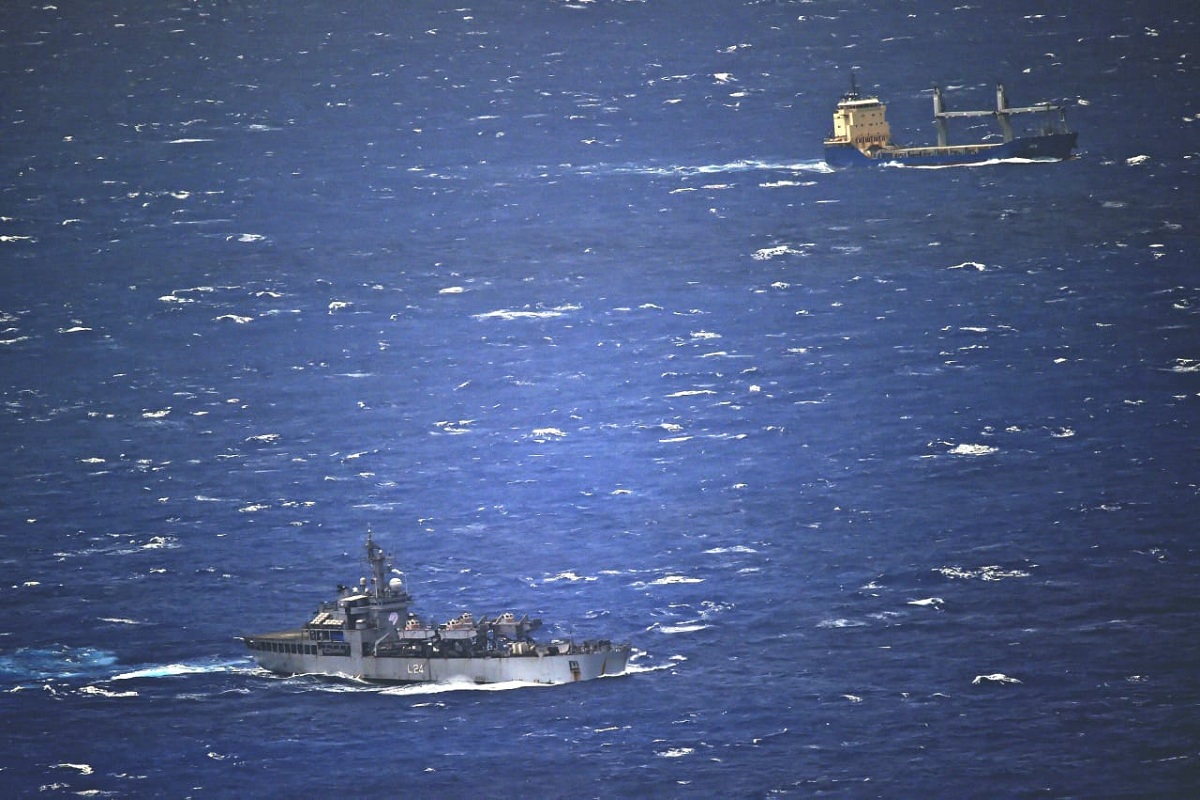Indian Navy inducts 8th MCA barge, strengthening operational capabilities
The Indian Navy marked the induction of its eighth Missile Cum Ammunition (MCA) barge, LSAM 11 (Yard 79), in a ceremonial event held at the Naval Dockyard, Mumbai, today.
On 9th of October, UNWFP was selected from amongst 318 nominees and awarded the Nobel Peace Prize – 2020 “for its efforts to combat hunger …. contribution to bettering conditions for peace in conflict-affected areas …. and prevent the use of hunger as a weapon of war and conflict”.

INS Airavat escorting MV Juist in Heavy Seas off Somalia. (Visual Courtesy - Indian Navy)
United Nations World Food Programme (UNWFP) is the world’s largest humanitarian organization. In 2019, UNWFP assisted nearly 100 Million people in 88 countries, delivering emergency food-aid and working with communities to build resilience against hunger. It is estimated that one in nine people worldwide still does not have enough to eat: food-aid, therefore, lies at the heart of the war against hunger and poverty.
On 9th of October, UNWFP was selected from amongst 318 nominees and awarded the Nobel Peace Prize – 2020 “for its efforts to combat hunger …. contribution to bettering conditions for peace in conflict-affected areas …. and prevent the use of hunger as a weapon of war and conflict”.
Advertisement
UNWFP was formed in 1961 and its operations are funded by voluntary donations from governments, corporations, and private donors. In 2019, UNWFP received a total of USD 8 Billion from donors, and in turn, provided $2.1 Billion as cash assistance in 64 countries.
Advertisement
Each day, UNWFP operates 5,600 trucks, 30 ships and 100 aircraft, delivering food-aid to some of the most remote and challenging parts of the world. In 2019, UNWFP delivered 4.4 Million tons of food-aid corresponding to over 15 Billion individual rations, at an average cost of Rs 40 each. Over 17.3 Million children are also provided daily school meals by the programme, with the majority being girls.
UNWFP is also on the global frontlines of providing support, responding to emergencies caused by conflict, climate shocks, pandemics, and disasters. Presently, UNWFP is involved in aiding in 20 countries/ regions, the majority fueled by conflict. Given the importance of food for human sustenance, especially in conflict/ disaster zones, the security of UNWFP’s food shipments is critical during its transit to the intended destination. Further, nearly 75% of all UNWFP food-aid travels by sea, corresponding to an annual figure of 3.25 million tonnes.
Indian Navy’s Assistance to UNWFP
Since 2008, the Indian Navy has been providing security against piracy attacks to transiting ships (including UNWFP ships) in the Gulf of Aden and the Red Sea. With an increasingly global profile and responsibility towards maintaining a rules-based order, the Indian Navy also transitioned to Mission-Based Deployments in 2017, which has facilitated the continuous presence of warships in critical shipping lanes across the Indian Ocean Region. These warships are equipped to meet any eventuality, ranging from Humanitarian Assistance and Disaster Relief (HADR) missions to acts of Maritime Terrorism and Piracy.
In 2018, Indian Navy ships started undertaking focused missions off the East Africa coast and in the Red Sea to escort UNWFP chartered ships, whilst operating under the UN mandate. These UNWFP ships carry emergency food-aid for the people of Horn of Africa and East Africa, where there is a looming risk of famine.
INS Sunayna, an indigenously built Naval Offshore Patrol Vessel escorted a UNWFP chartered dhow Al Dahab in December 2018 [a dhow is a large traditional wooden vessel used to transport cargo in the Red Sea and Indian Ocean]. Al Dahab carried 360 tons of humanitarian food aid from the port of Bosaso in North-East Somalia to Berbera in Western Somalia, a distance of over 600 km by sea.
These missions by Indian Navy’s warships to escort UNWFP chartered vessels have been contributing towards the noble, humanitarian mission of the UNWFP, and is in consonance with the vision of SAGAR (Security And Growth for All in the Region), espoused by PM Narendra Modi in 2015.
Benign Role of Indian Navy
Over the years, there has been increasing appreciation, understanding and a growing willingness to leverage the Benign capability of the Indian Navy. Our Navy’s warships have undertaken various HADR missions in recent years: post Cyclone Berguitta in Mauritius in January 2018; ‘Op Sahayta’ in October 2018 post earthquake in Indonesia and again in March 2019 in Beira, Mozambique in aftermath of Cyclone Idai; ‘Op Vanilla’ in January 2020 in Antsiranana, Madagascar in aftermath of Cyclone Diane; ‘Mission SAGAR’ in May-June 2020 to provide COVID-relief to IOR countries; salvage operations due to grounding of MV Wakashio off Mauritius in August 2020; and fire-fighting and salvage of MT New Diamond off Sri Lanka in September 2020.
Additionally, Naval warships have also undertaken emergency repatriation of our citizens: from the conflict zone in Beirut, Lebanon ‘Op Sukoon’ in July-August 2006; from war-torn Yemen ‘Op Rahat’ in March-April 2015; and from COVID-affected IOR nations ‘Op Samudra Setu’ in May-July 2020.
Indian Navy has been adept at leveraging the distinctive characteristics of its warships, namely access, mobility, sustained reach, flexibility and most importantly versatility – the unique ability of a warship to instantly switch between its military, diplomatic, constabulary and benign roles. Assistance being provided to Nobel Peace Laureate UNWFP is one of the Indian Navy’s noblest missions and validates the Navy’s epithet – ‘Preferred Security Partner’.
(The writer is a Delhi-based independent contributor to print and online publications. He is a DCC qualified defence beat writer)
Advertisement